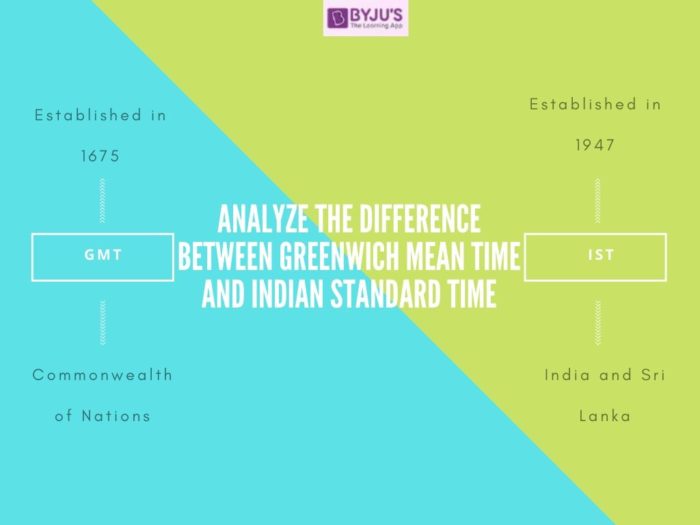A time zone is a region if the planet that observes a uniform standard of time for commercial, social and legal purposes. GMT and IST are two such time zones
Greenwich Mean Time (GMT) is the mean solar time at the Royal Observatory in Greenwich, London which is measured at midnight. In English speaking nations, GMT is often used synonymously with Universal Time Coordinate (UTC).
Indian Standard Time (IST) is the time zone observed throughout India. It does not take into account daylight saving time along with other seasonal factors. India has only one time zone.
*IST is ahead of GMT by 5:30 Hours.

In this article, we will examine the differences between the GMT (Greenwich Mean Time) and IST (Indian Standard Time). They both are recurring terms under the Geography segment of the IAS Exam.
Differences between GMT and IST
| GMT (Greenwich Mean Time) |
IST (Indian Standard Time) |
| The Greenwich Mean Time was established by the Royal Observatory in 1675 with the purpose of assisting navigators at sea. | The Indian Standard Time was established as the official time zone of India upon its independence on August 15th, 1947 |
| When calculating GMT it is considered equivalent to UT1 (the modern form of mean solar time at 0° longitude), but this meaning can differ from UTC by up to 0.9 seconds. | The IST is calculated on the basis of a clock tower in Mirzapur (with coordinates 25.15° North Latitude and 82.58° East longitude). |
| Because of Earth’s uneven angular velocity in its elliptical orbit, GMT is rarely the exact moment the Sun crosses the Greenwich meridian | Official time signals are generated by the Time and Frequency Standards Laboratory at the National Physical Laboratory in New Delhi, for both commercial and official use. The signals are based on atomic clocks and are synchronised with the worldwide system of clocks |
| Since legal, political and geographical criteria, are used in the drawing of time zones, actual time zones do not precisely adhere to meridian lines.
The same holds true for GMT as well because there will be discrepancies between legal and geographic GMT |
The IST is insufficient to cover the geographical expanse of India.
The reason is that such is the east-west distance covers about 2933 kilometres and 29 degrees of longitude resulting in the sun rising and setting almost two hours earlier on the eastern borders of India than its western borders. The proposals to divide the country into different timezones have been taken into consideration by the government of India as of late to overcome this drawback. |
| The term Greenwich Mean Time is used commonly in the United Kingdom and in the Commonwealth of Nations such as Australia, New Zealand and many other countries of the Eastern Hemisphere | Indian Standard Time is used observed in India and Sri Lanka but it takes references from the UTC (Universal Time Coordinate). The UTC has been developed as a successor to the Greenwich Mean Time |
Aspirants can find study materials for the Geography segment of the UPSC Exams through the links given below
- NCERT Notes for UPSC Geography
- Geography Syllabus for UPSC Exam
- Tricks to Study Geography for UPSC Exam
- Difference Between Physical and Human Geography
- Free NCERT Geography Books for UPSC
- 100 Difference Between Articles
Difference Between GMT and IST – Download PDF Here
Become familiar with the general pattern of the UPSC Exams by visiting the UPSC Syllabus page. For more preparation materials they can refer to the links given in the table below:
Related Links
| NCERT Books | UPSC Exam Pattern | Current Affairs Quiz |
| Current Affairs PDF | Universal Civil Code | PIB Summary and Analysis |
| Green Revolution in India | Ujala Yojana | Article 32 |
Relevant Links
Comments